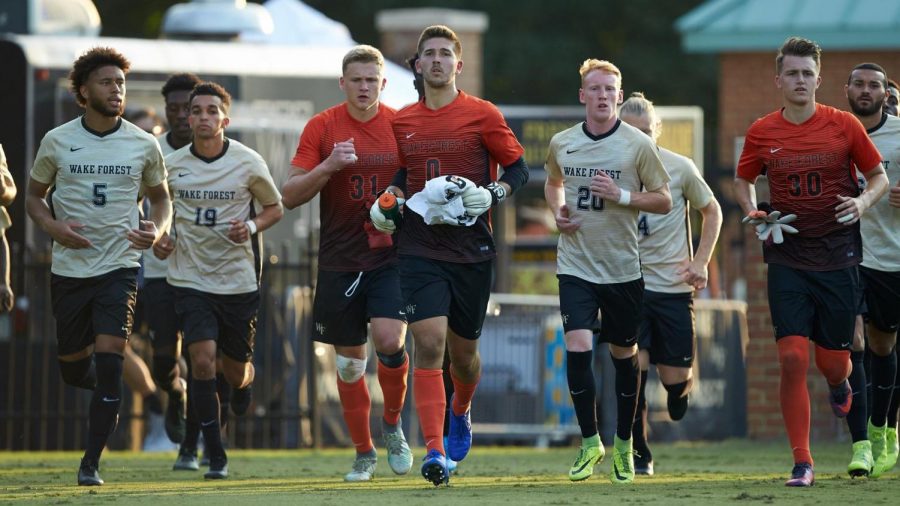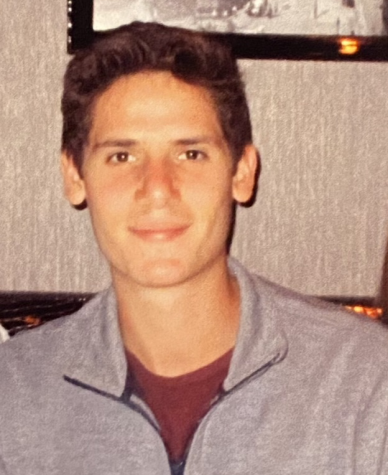The Keeper’s Perspective
Meet Cole McNally, a “coach’s dream”
Wake Forest goalie Andrew Pannenberg, who was drafted by Orlando City in this year’s MLS Draft, running with McNally.
December 1, 2021
When I asked his coach, teammate and professor to describe Cole McNally with just one word, each failed miserably. They used terms like “a coach’s dream,” “a literal ray of sunshine” and “a marble statue.” They called him “annoyingly nice,” “absolutely outstanding” and “a true value-add.” Not once did I hear anything along the lines of resentful, hostile or sour.
And so, really, I shouldn’t be surprised when I went digging for some ill-will or bitterness and came up entirely empty-handed.
And yet, I am.
“What’s it like to suffer a freak injury in the game before the ACC-opener? To work tirelessly, day-in and day-out in rehab, so you can rejoin the team as soon as possible? To find that your one-time backup — a true freshman — upon having the door left open to him, has run with his opportunity, allowing an average of just a goal-a-game over his last seven, one of which was a win over the No. 5 ranked team in the nation? That your replacement has given the coaching staff no choice but to let him continue on this pursuit and see what heights he can take the squad to?” I asked McNally.
The netminder returned my question only with a bewildered stare, and so I needed to take a different approach to draw out that tension and animosity. I wanted to leave the door open, invite him to fill in the blanks.
“Tell me about Trace Alphin. What’s he like?”
This time there’s no hesitation in his answer
“Trace?” McNally said. “That’s my brother.”
The Goalkeeping Unit
“Family and development,” Dane Brenner, Wake Forest soccer’s associate head coach said. “That’s what our program’s about. That’s what [McNally]’s about.”
Brenner — a member of the coaching staff for the past 12 seasons — first met McNally when he stopped by to visit Wake Forest on his way home from a beach trip in 2017.
“His recruiting visit … he was on the way back with his family … it included [McNally], his parents, six siblings and two dogs. I guess it went well enough,” Brenner said.
It must have. The No. 10-ranked goalkeeper in the country had his choice of schools — Stanford, Georgetown, Maryland and Duke — but wanted to be a Demon Deacon.
He says the choice was an easy one. As soon as he stepped onto Wake Forest’s campus, he fell in love.
“The family atmosphere here … [you can’t] get that anywhere else in the country,” McNally said.
After redshirting during his first season, McNally was thrust into action in year two. During his redshirt freshmen campaign (2020-21), he made nine starts, recorded four shutouts and finished the season with a goals-against-average of 1.00.
Of the Demon Deacons’ 21 games this season, though, McNally has seen the field on only six occasions. He got the starting nod on opening night, giving up two goals on seven shots (the only two he gave up all year), then followed up the loss with a shutout (his first of three among five total starts) against Bucknell.
When the Cornell Big Red came to Spry Stadium a week later, McNally got the starting nod once again, but he only made it to minute 65. Upon coming out to retrieve a ball, he collided with the post, splitting his knee open. The injury, though minor, required stitches and rehabbing.
When McNally was back up on his feet, healthy and ready to go, the starting job belonged to Alphin.
Over the remainder of the season, McNally made three more starts, all against out-of-conference opponents. In all ACC-matches, during the conference championship and then in the NCAA tournament, it was Alphin in goal.
“Here, nothing’s given. Everything is earned,” McNally said. “Credit to [Alphin] because he has earned it. Whatever needs to be done to give the team the best chance to succeed … I’m on board.”
Given the transfer of power, you’d expect some contempt. But as Alphin said, “There is no beef. We’re both hardcore competitors … we just fuel each other’s fire.”
The first time Alphin met McNally was when he came to see a Wake Forest practice in early December 2019. The team had a session ahead of their quarterfinals matchup against University of California, Santa Barbara later that evening, and Alphin remembers quietly watching from the sideline as the team went through stretching and warmups. He says McNally was the first to approach him and introduce himself.
“Big old baseball-mitt handshake. I was like, ‘this is a big guy right here,’” Alphin remembered.
That night, after a thrilling 1-0 Wake Forest victory, McNally learned that Alphin was staying overnight and offered to put him up in his room.
“He made sure I was all settled in, had everything I needed and knew where the bathroom was … then he left,” Alphin said. “He didn’t play in the game [earlier that evening], so he went out to the field to do some fitness … even [today], while the rest of us are hopping in the ice bath, I see him walking back from the gym. That shows you how bad he wants it.”
That mindset is as intractable a piece of McNally as the baseball-mitt hands are.
“He wants it at the highest levels, at the most intensity. It’s a great quality to have,” Brenner said.
Big Guy, Little Things
If the Hulk was 6’4” and 220 pounds, with blonde hair, blue eyes and a perpetual smile so wide you’d think it was caused by some strange medical condition, you might mistake him for McNally.
“He eats right and drinks right, trains hard and works his ass off,” Brenner said. “You don’t see kids who take care of all the little details like that too often.”
The importance of taking care of those little things is something McNally learned from his grandmother, Gigi.
With his dad at work and his mom tending to the other five siblings, McNally spent much of his childhood with Gigi, who he described as “probably the greatest person ever … an angel.” For years, she drove him to and from club soccer practices, held almost an hour from his house, multiple times a week.
While her 11-year-old grandson was training, Gigi would hit tennis balls off the wall to herself on the adjacent court, biding her time until his session was over, and they’d embark on the hour-long drive home. On these weekday afternoons, McNally remembers his grandmother only ever traveling with her racket. There were always balls lying around the court, and after a few hours of thumping them against the wall and back to herself, she’d line all the balls back up where she had found them.
On one of their rides home, McNally asked Gigi why she never took any of the tennis balls with her. How would she fill the time during his next practice if she found out someone had made off with all her ammunition?
“She said she was tempted … it’s not like there was anyone else there to see it,” McNally said. “But, she told me there was something in her conscience, a voice telling her it’s not the right thing to do … truly what you do when nobody’s looking, she believed that’s what defines character.”
McNally continued: “I know it sounds small and stupid, but looking back, that tennis ball story has guided so much of what I’ve done in my life. Never underestimate the impact and effect that your little actions can have.”
Ask any teammate or coach, and they’ll tell you that, both on and off the pitch, it’s damn near impossible not to feel McNally’s effect.
“He’s in every optional lift, rollout or stretch,” Alphin said. “Once a week he’ll send a message in our team group chat saying he’s holding a swim training or something like that.”
After grueling sessions held during this past summer — early morning strength training, then running — McNally began leading a yoga routine at the end of every practice.
“He’s pushing us beyond our comfort zone,” Alphin said. “I don’t even think he has a comfort zone.”
Brenner added: “Culture is the reason we win a lot of games, but what culture really is … it’s the choices guys make on a day-to-day basis … if you don’t have guys like McNally, you [don’t have] culture.”
Math, Business and Marines
“Each day we’re presented with so many decisions,” McNally said. “We all have that voice in our head that steers us down one path or another … there’s one that’s easy and fun, [but that’s not always] the right one.”
Easy is taking 12 credit hours or choosing a major that won’t require too much time or effort, so you can focus on other responsibilities, like minding the net for one of the most-well respected collegiate soccer programs in the country.
What’s not easy is pursuing a degree in the mathematical business joint-major.
Those seeking admission to the program must submit a formal application, satisfy all the “normal” graduation requirements prescribed by both the Department of Mathematics & Statistics and the School of Business and pass an additional 14 required courses, including Multivariable Calculus and Linear Algebra, among others.
“I knew it was going to be difficult,” McNally said of the degree he’s pursuing. “I knew the workload would be heavier, but at the same time, I feel very fortunate to have the opportunity to attend this institution. Why not make the most of it?”
Professor Kenny Herbst, who teaches McNally’s Principles of Marketing class, says he’s not just going through the motions, either.
“He’s always prepared for class … sitting in the front row, engaged, with his hand raised. And he’s not just speaking for airtime, he’s got something insightful to add to the discussion.”
“And when McNally talks, people listen,” Herbst added.
Though his inclination has always been soccer, McNally knows he has to look forward. “Soccer is temporary. A degree — that’s going to last a lifetime.”
It’s admirable, but what exactly does one do with a mathematical business degree?
“My application of it would probably be within the data analytics field … optimizing efficiency,” McNally said.
Thankfully I don’t have to formulate a coherent follow-up question, as he had more to say.
“However, I want to join the military. My whole mom’s side of the family — they were all Marines … to have that opportunity to take those math-business components and apply them in a military setting, that’d be an honor.”
That Kind of Kid
“It’s almost like you want to catch him doing something wrong,” Brenner said. “You want to open up the newspaper and see his name in there for the wrong reason, but you never will. That’s just the kind of kid he is.”
It’s exactly the kind of kid he is.
McNally’s the one who hangs around with the younger guys in the locker-room after practice, so he can “pick their brains and hear their stories.” He’s the one who, every time the team bus arrives at its destination, is side-by-side with the freshmen lugging bags of gear to wherever they need to go. He’s the one who, while his 30 teammates are racing to the showers as soon as practice ends, is picking up the Gatorade cups, so the people who are paid to do this work won’t have to. He’s the one who, upon seeing a housekeeper cleaning up his teammates’ spread at a team hotel, strikes up a conversation — in near-perfect Spanish — and lights up a smile across her face that only his could rival. He’s the one who, immediately after we bid each other goodbye after an interview, shoots me a text thanking me for my time.















